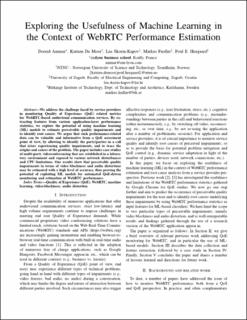| dc.contributor.author | Ammar, Doreid | |
| dc.contributor.author | De Moor, Katrien | |
| dc.contributor.author | Skorin-Kapov, Lea | |
| dc.contributor.author | Fiedler, Markus | |
| dc.contributor.author | Heegaard, Poul Einar | |
| dc.date.accessioned | 2020-03-23T08:56:08Z | |
| dc.date.available | 2020-03-23T08:56:08Z | |
| dc.date.created | 2019-12-10T10:27:09Z | |
| dc.date.issued | 2019 | |
| dc.identifier.isbn | 978-1-7281-1028-8 | |
| dc.identifier.uri | https://hdl.handle.net/11250/2648020 | |
| dc.description.abstract | We address the challenge faced by service providers in monitoring Quality of Experience (QoE) related metrics for WebRTC-based audiovisual communication services. By extracting features from various application-layer performance statistics, we explore the potential of using machine learning (ML) models to estimate perceivable quality impairments and to identify root causes. We argue that such performance-related data can be valuable and informative from a QoE assessment point of view, by allowing to identify the party/parties in a call that is/are experiencing quality impairments, and to trace the origins and causes of the problem. The paper includes case studies of multi-party videoconferencing that are established in a laboratory environment and exposed to various network disturbances and CPU limitations. Our results show that perceivable quality impairments in terms of video blockiness and audio distortions may be estimated with a high level of accuracy, thus proving the potential of exploiting ML models for automated QoE-driven monitoring and estimation of WebRTC performance. | en_US |
| dc.language.iso | eng | en_US |
| dc.publisher | Institute of Electrical and Electronics Engineers (IEEE) | en_US |
| dc.relation.ispartof | 44th Annual IEEE Conference on Local Computer Networks (LCN 2019) | |
| dc.title | Exploring the Usefulness of Machine Learning in the Context of WebRTC Performance Estimation | en_US |
| dc.type | Chapter | en_US |
| dc.description.version | acceptedVersion | en_US |
| dc.identifier.doi | 10.1109/LCN44214.2019.8990677 | |
| dc.identifier.cristin | 1758676 | |
| dc.description.localcode | © 2019 IEEE. Personal use of this material is permitted. Permission from IEEE must be obtained for all other uses, in any current or future media, including reprinting/republishing this material for advertising or promotional purposes, creating new collective works, for resale or redistribution to servers or lists, or reuse of any copyrighted component of this work in other works. | en_US |
| cristin.unitcode | 194,63,30,0 | |
| cristin.unitname | Institutt for informasjonssikkerhet og kommunikasjonsteknologi | |
| cristin.ispublished | true | |
| cristin.fulltext | preprint | |
